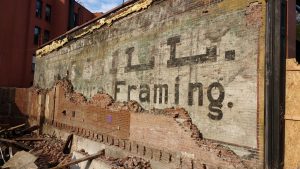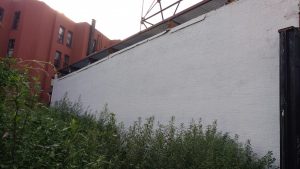I remembered I’d taken a photo of the crumbling party wall and the ghost signs concealed by the recently demolished building at the corner of Fifth Avenue and Flatbush Avenue last fall:
Today the site has been prepared for new uses yet is now overgrown with plants, indicating no construction has been happening lately:
Thanks, everyone, for participating in a great site visit today. The first site report is due on Thursday, September 27. Remember to save a copy of the site report template, and then edit it with your content and responses. On Tuesday we’ll discuss research in archives and special collections in preparation for our research visit to the New York Public Library Map Division, 476 Fifth Avenue at 42nd Street, on Thursday, September 27 from 3-4:30pm. Before Tuesday’s class, please read the articles linked below, and comment on this post with 2 questions you have about these readings:
Introduction to Archives, Visiting the Archives, and Citing Archival Sources from the Purdue OWL
What are archives and how do they differ from libraries? and Using Archives: A Guide to Effective Research from the Society of American Archivists
Primary, Secondary, and Tertiary Sources from Virginia Tech libraries
~Prof. L.






1. What kind of archives are we going to use? Are we using them in our site report?
2. What is the difference between archives and the academic sources we found in the library websites?
1) Why should we use archives?
2) Do we have the option to work with archives or library sources?
1. How do you determine if an object belongs into an archive, or is use as display for a museum?
2. What does it take an object to become an archive?
1. Can we gather more reasonable information from archive rather then the Library?
2. Would archives be a better resource for us?
1. How do we know if a archive given by the museum or library is not altered, edited by someone else.
2. Can an interview with a person who was witness of an important event in the past become an archive.
1. Is it common to have an archive within a library or vice versa?
2. If we use an archive for this class, what citation format do we use?
1) Does Citytech have an archived? if so does it have any important background objects?
2) What makes an artifact qualify as an archive or museum object and How do they differ from each other?
1, What kinds of archives does Citytech hold on to?
2. What kinds of archives can we use as a class in order to further our research into certain parts of NYC?
Do our school provide the archives we need?
Is it true of how helpful an Archival can be? do they really have all the answer to my questions?
1) What type of archives are we going to be focusing on at in the library?
2) Are we going to be seeing archives related to our walking tours?
1. In response to most of the articles, “Using Archives: A Guide to Effective Research” in particular, the further classification of different archives made me wonder about our college’s archives. Being as we meet on a bi-weekly basis for class in what is called the “Archive Room”, I wondered if we had any pertinent archives/resources/information in our very own school that may be valued for this course?
2. When it comes to the two options they had listed in the “Citing Archival Sources” article, which is the more commonly (without receiving exact citation instructions) desired method to use?
In the case where an archive is damaged or lost after the document or object was cited and used, is the source still usable. In other words is the an argument or statement supported by a citation no longer useful in a paper if the source can’t be found?
Do archives create secondary documents in case a primary document is lost? For example a picture or a scan of the original document. Will this still be considered to be of the same value when citing it in paper?
1) How do we get access to city tech archives?
2) Are we going to see the original archive material in person or digital versions?
1. Are most archives within citytech dated and digitized for proper preservation?
2. How important are archives to probable uses of research assignments?